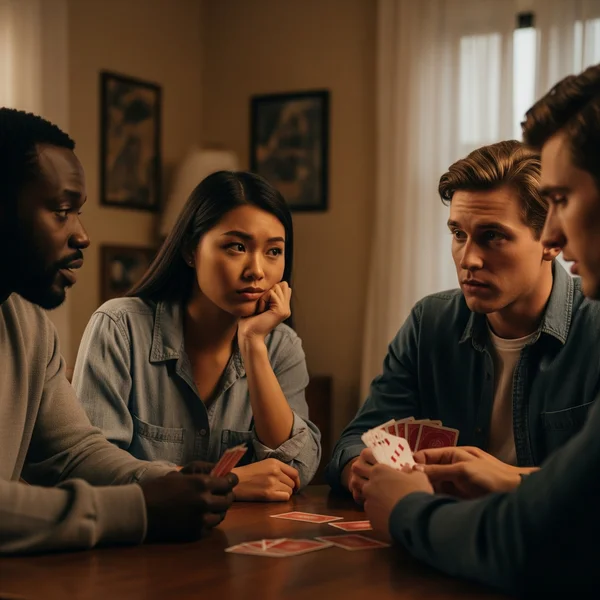Is Never Have I Ever Inappropriate? Play Respectfully
Never Have I Ever is a fantastic party game known for sparking laughter and surprising revelations. But with its potential to delve into personal experiences, a common question arises: Is Never Have I Ever inappropriate? The truth is, the game itself is neutral; its appropriateness entirely depends on how you play it. This guide will help you navigate the fun, ensuring your Never Have I Ever sessions are always safe, respectful, and enjoyable for everyone involved. Learning how to play Never Have I Ever safely is key to a great experience.
Understanding Why "Never Have I Ever" Can Be Sensitive
Why does this game sometimes skate close to the line of being inappropriate? Several factors can contribute:
- Question Type: The nature of the "Never have I ever..." statements can range from completely innocent to deeply personal or even risqué (Never Have I Ever 18+ style questions).
- Personal Privacy: What one person is comfortable sharing, another might find too private.
- Group Dynamics & Pressure: In some groups, individuals might feel pressured to answer or share more than they're comfortable with.
- Lack of Clear Boundaries: Without established ground rules, the game can unintentionally veer into uncomfortable territory.
- Misunderstanding the Vibe: What's considered funny in one group might be offensive in another.
Recognizing these sensitive topics is the first step toward respectful gaming.

Key Principles for Playing Never Have I Ever Safely & Respectfully
To ensure a positive experience and avoid making the game inappropriate, consider these core principles:
Enthusiastic Consent is Non-Negotiable
This is the golden rule for any social interaction, especially games involving personal sharing.
- What it means: Everyone playing must genuinely and enthusiastically agree to participate and be comfortable with the potential nature of the questions. Consent in games isn't just a "yes"; it's an ongoing process.
- How to ensure it: Before starting, check in with everyone. If you plan on using potentially sensitive questions (like those from a Never Have I Ever 18+ list), make that clear upfront.
Know Your Audience: Tailor Questions to the Group
The questions you ask should always be appropriate for the people playing.
- Consider: Ages, relationships within the group (friends, family, colleagues), cultural backgrounds, and general comfort levels.
- Action: Choose or generate safe Never Have I Ever questions that align with your group's specific dynamic.
Establish Clear Boundaries Before You Start
Setting boundaries in games is crucial for a comfortable environment.
- What to do: Briefly discuss what topics might be off-limits for the group. This doesn't need to be a long, formal discussion, but a quick check-in can prevent awkwardness.
- Example: "Hey everyone, let's try to keep it fun and avoid anything too personal unless we all feel up for it, okay?"

The "Pass" Rule: No Pressure to Answer
This is a fundamental aspect of playing Never Have I Ever safely.
- Implement: Make it clear from the outset that anyone can "pass" on answering a question or sharing a story, no questions asked and no judgment.
- Why it matters: This empowers individuals and removes pressure, ensuring a more comfortable environment.
Focus on Fun, Not Judgment
The spirit of Never Have I Ever is about lighthearted fun and connection.
- Maintain: Encourage laughter and sharing, but actively discourage any teasing, shaming, or negative judgment about someone's experiences or choices. Good party game etiquette means being a good sport.
Choosing Appropriate Never Have I Ever Questions for Different Settings
How do I play Never Have I Ever safely in various contexts? Selecting appropriate game questions is key.
With Close Friends: More Room for Personal (But Still Respectful!) Questions
- Vibe: Usually more relaxed, higher trust.
- Question Style: You can often delve into more personal anecdotes, past relationships (if everyone is comfortable), or funnier, slightly embarrassing moments. Still, always be mindful of individual sensitivities.
- Tip: Even with close friends, checking in about comfort levels with sensitive topics is a good idea.
With Family: Keep it Light, Nostalgic, and Clean (Consider "Never Have I Ever for Family")
- Vibe: Focus on shared memories, lighthearted fun, and inclusivity for all ages present.
- Question Style: Think childhood memories, funny family traditions, innocent mishaps. Avoid topics related to adult relationships, risky behaviors, or anything that could make older or younger family members uncomfortable. Many safe Never Have I Ever questions are perfect for this.
- Tip: This is a great opportunity for intergenerational bonding.
At Work or Professional Events: Stick to Safe, General Icebreakers (Consider "Never Have I Ever for Work")
Can Never Have I Ever be used for work? Yes, if handled with extreme care and appropriate questions.
- Vibe: Professional, inclusive, focused on team building or light icebreaking, not personal disclosures.
- Question Style: Strictly work-related (e.g., "Never have I ever accidentally hit 'reply all' on an embarrassing email"), very general hobbies (e.g., "Never have I ever run a marathon"), or completely neutral and silly (e.g., "Never have I ever tried to assemble IKEA furniture without instructions").
- Crucial: Avoid any questions about personal life, relationships, past jobs (unless very generic), or anything that could be misconstrued or cause discomfort in a professional setting. Excellent party game etiquette is paramount here.

What About "Never Have I Ever 18+" or Spicy Questions?
When it comes to Never Have I Ever 18+ or "Spicy" questions, the potential for the game to be perceived as inappropriate significantly increases if not managed correctly.
- Strictly Adults Only: These are never suitable for mixed-age groups or public/work settings.
- Enthusiastic Consent is Paramount: Don't just assume everyone is okay with it. Have an explicit conversation.
- Boundaries are Even More Critical: What's "spicy" for one person might be offensive to another.
- Our Stance: While we offer various game categories, we always advocate for responsible play. If you choose to use spicier questions, do so with full awareness and respect for everyone involved.
Party Game Etiquette: Beyond Just Never Have I Ever
The principles of respectful gaming extend beyond just this one game. Good party game etiquette generally involves:
- Being a gracious winner and loser.
- Paying attention when others are speaking or taking their turn.
- Not dominating the game.
- Helping to create an inclusive and fun atmosphere for everyone.
- Understanding and respecting the game guidelines being used.
Creating a Positive Experience: It's All About Respect
Ultimately, whether Never Have I Ever feels inappropriate or like a wonderfully connecting experience comes down to the respect shown by all players. When played thoughtfully, it's a fantastic way to bond.
What We Learned
So, is Never Have I Ever inherently a "bad" or inappropriate game? No, not at all. Like many social tools, its impact depends entirely on how it's wielded. By focusing on enthusiastic consent, knowing your audience, setting clear boundaries, and prioritizing fun over judgment, you can ensure your Never Have I Ever sessions are always a positive experience. The key is playing Never Have I Ever safely and respectfully.
Ready to put these principles into practice? You can find appropriate questions for any group on our site, ensuring everyone has a great time.
What are your top tips for keeping party games fun and respectful? Share your thoughts in the comments!
Playing Never Have I Ever Respectfully FAQ
Here are some common questions about ensuring a respectful game:
Is Never Have I Ever inherently a "bad" or inappropriate game?
No. The game framework itself is neutral. It becomes inappropriate only if the questions asked are unsuitable for the group, if players feel pressured, or if boundaries are disrespected. With the right approach, it's a fantastic game.
How do I stop a game if it becomes uncomfortable?
Anyone should feel empowered to pause or stop a game. You can politely say something like, "Hey, can we switch to some lighter questions?" or "I think I'm going to sit this round out." If you're the host, it's your responsibility to be attuned to the group's comfort and intervene if needed by suggesting a change of pace or different safe Never Have I Ever questions.
Can Never Have I Ever be a good icebreaker for work if played carefully?
Yes, but with extreme caution and very carefully selected, work-appropriate, and completely neutral questions. Focus on shared, non-personal work experiences or extremely G-rated general topics. The risk of it becoming inappropriate is higher in a work context, so clear guidelines are essential.
Where can I find pre-vetted safe questions for different groups?
You can check out our resources for a wide variety of Never Have I Ever questions, including categories specifically designed to be safe and fun for different audiences, like teens or general party crowds.